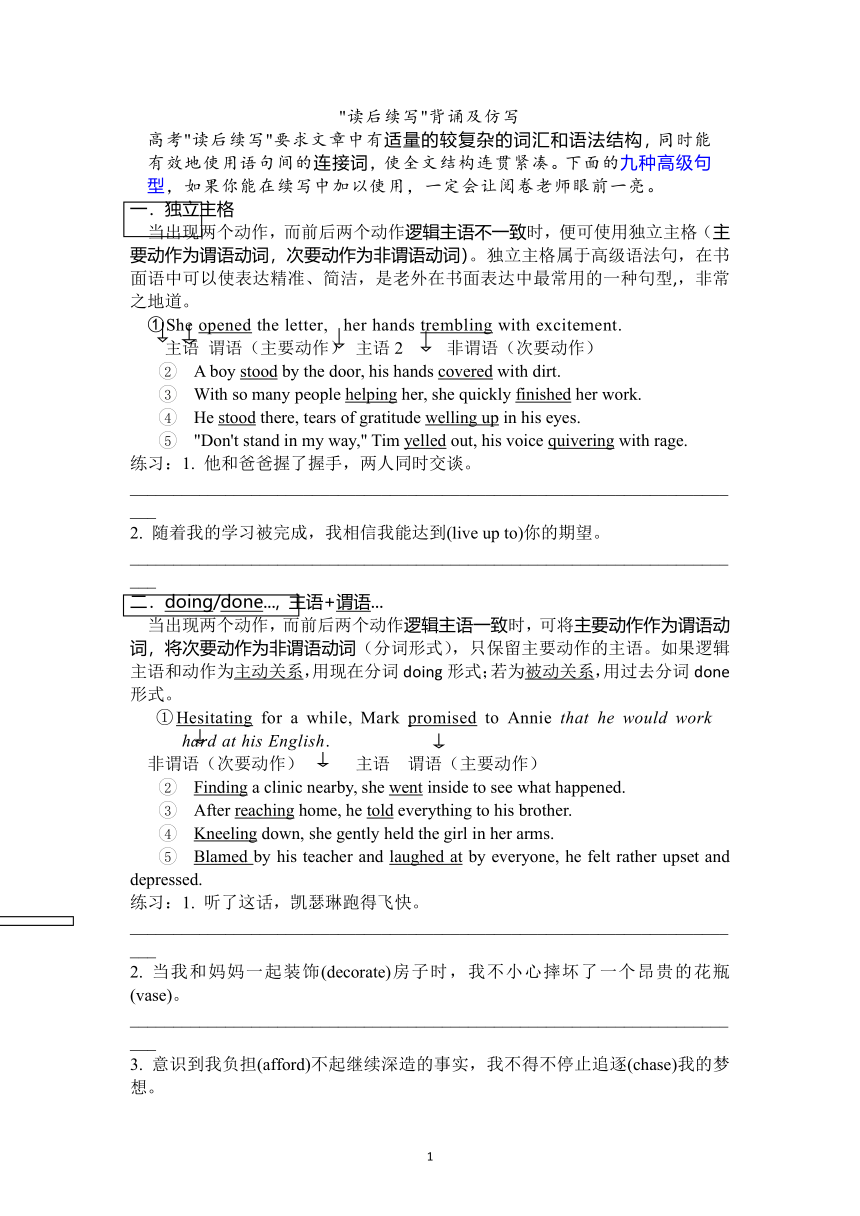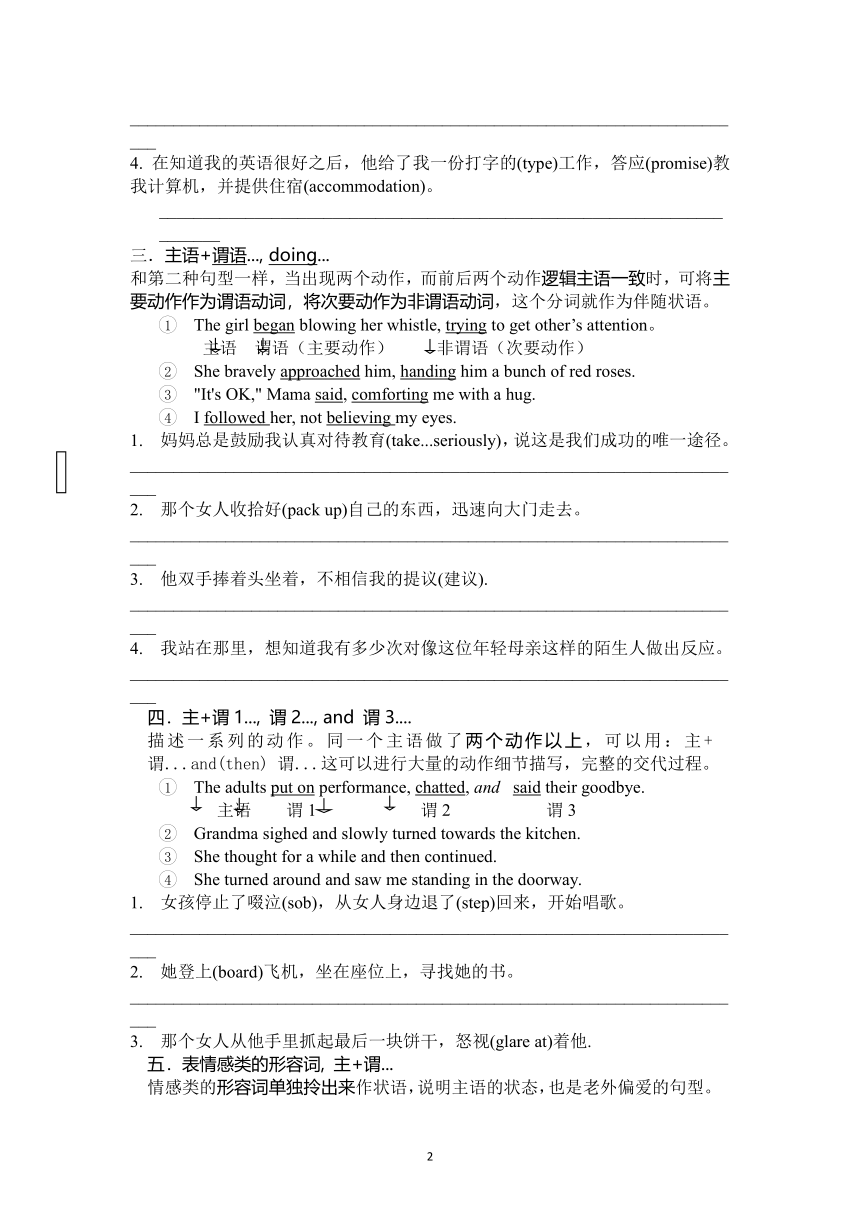高考英语读后续写高级句型背诵学案(无答案)
文档属性
| 名称 | 高考英语读后续写高级句型背诵学案(无答案) |  | |
| 格式 | zip | ||
| 文件大小 | 85.5KB | ||
| 资源类型 | 教案 | ||
| 版本资源 | 通用版 | ||
| 科目 | 英语 | ||
| 更新时间 | 2022-07-27 18:54:30 | ||
图片预览


文档简介
"读后续写"背诵及仿写
高考"读后续写"要求文章中有适量的较复杂的词汇和语法结构,同时能有效地使用语句间的连接词,使全文结构连贯紧凑。下面的九种高级句型,如果你能在续写中加以使用,一定会让阅卷老师眼前一亮。
一.独立主格
当出现两个动作,而前后两个动作逻辑主语不一致时,便可使用独立主格(主要动作为谓语动词,次要动作为非谓语动词)。独立主格属于高级语法句,在书面语中可以使表达精准、简洁,是老外在书面表达中最常用的一种句型,,非常之地道。
①She opened the letter, her hands trembling with excitement.
主语 谓语(主要动作) 主语2 非谓语(次要动作)
2 A boy stood by the door, his hands covered with dirt.
3 With so many people helping her, she quickly finished her work.
4 He stood there, tears of gratitude welling up in his eyes.
5 "Don't stand in my way," Tim yelled out, his voice quivering with rage.
练习:1. 他和爸爸握了握手,两人同时交谈。
________________________________________________________________________
2. 随着我的学习被完成,我相信我能达到(live up to)你的期望。
________________________________________________________________________
2.doing/done..., 主语+谓语...
当出现两个动作,而前后两个动作逻辑主语一致时,可将主要动作作为谓语动词,将次要动作为非谓语动词(分词形式),只保留主要动作的主语。如果逻辑主语和动作为主动关系,用现在分词doing形式;若为被动关系,用过去分词done形式。
①Hesitating for a while, Mark promised to Annie that he would work hard at his English.
非谓语(次要动作) 主语 谓语(主要动作)
2 Finding a clinic nearby, she went inside to see what happened.
3 After reaching home, he told everything to his brother.
4 Kneeling down, she gently held the girl in her arms.
5 Blamed by his teacher and laughed at by everyone, he felt rather upset and depressed.
练习:1. 听了这话,凯瑟琳跑得飞快。
________________________________________________________________________
2. 当我和妈妈一起装饰(decorate)房子时,我不小心摔坏了一个昂贵的花瓶(vase)。
________________________________________________________________________
3. 意识到我负担(afford)不起继续深造的事实,我不得不停止追逐(chase)我的梦想。
________________________________________________________________________
4. 在知道我的英语很好之后,他给了我一份打字的(type)工作,答应(promise)教我计算机,并提供住宿(accommodation)。
________________________________________________________________________
三.主语+谓语..., doing...
和第二种句型一样,当出现两个动作,而前后两个动作逻辑主语一致时,可将主要动作作为谓语动词,将次要动作为非谓语动词,这个分词就作为伴随状语。
1 The girl began blowing her whistle, trying to get other’s attention。
主语 谓语(主要动作) 非谓语(次要动作)
2 She bravely approached him, handing him a bunch of red roses.
3 "It's OK," Mama said, comforting me with a hug.
4 I followed her, not believing my eyes.
1. 妈妈总是鼓励我认真对待教育(take...seriously),说这是我们成功的唯一途径。
________________________________________________________________________
2. 那个女人收拾好(pack up)自己的东西,迅速向大门走去。
________________________________________________________________________
3. 他双手捧着头坐着,不相信我的提议(建议).
________________________________________________________________________
4. 我站在那里,想知道我有多少次对像这位年轻母亲这样的陌生人做出反应。
________________________________________________________________________
四.主+谓1..., 谓2..., and 谓3....
描述一系列的动作。同一个主语做了两个动作以上,可以用:主+谓...and(then) 谓...这可以进行大量的动作细节描写,完整的交代过程。
1 The adults put on performance, chatted, and said their goodbye.
主语 谓1 谓2 谓3
2 Grandma sighed and slowly turned towards the kitchen.
3 She thought for a while and then continued.
4 She turned around and saw me standing in the doorway.
1. 女孩停止了啜泣(sob),从女人身边退了(step)回来,开始唱歌。
________________________________________________________________________
2. 她登上(board)飞机,坐在座位上,寻找她的书。
________________________________________________________________________
3. 那个女人从他手里抓起最后一块饼干,怒视(glare at)着他.
五.表情感类的形容词, 主+谓...
情感类的形容词单独拎出来作状语,说明主语的状态,也是老外偏爱的句型。
1 Eager and excited, she flagged her yellow blouse, trying to attract others' attention.
2 To Annie's delight, surrounded by his classmates, Mark seemed like a rock star, cheerful and proud.
3 Jenny sat there, speechless and numb with shock.
4 Extremely worried, they decided to wait for them at this place.
1. 愤怒和失望, 我转过身面对她。
________________________________________________________________________
2. 我站在客厅门口,完全震惊了。
__________________________________
六.动词+副词(ly)
为了使动作精准,给读者在不在场时都有强烈的生动的画面感,经常放入句中用副词去修饰动词。
1 She picked up the baby gently, ran back outside and laid it on the sidewalk.
2 We listened to the teacher attentively in class.
3 She bravely followed the sound to an unknown place.
副词也可单独拎出来放在句首,修饰整个句子,在句中作状语。例如:
4 "Actually, I was touched by your kindness!" said Jenny, wiping her tears.
5 Amazingly, the boys recovered soon from the illness after being taken good care by his parents..
6 Fortunately, the cat was still alive, though badly injured.
1. 她勇敢地靠近他,递给他一串(a bunch of)钥匙。
________________________________________________________________________
2. 她伸手去握住我的手,深深地望着我的眼睛。
________________________________________________________________________
3. “我的姐姐刚刚去世,”她悲伤地说。
________________________________________________________________________
副词也可单独拎出来放在句首,修饰整个句子,在句中作状语。例如:
4. 难以置信的(难以置信的是), 当他照顾别人时,他感到自己一天比一天强壮。
________________________________________________________________________
5. 通常, 在这种尴尬的情况下,没有人会期望她讲话(give speech)。
________________________________________________________________________
6. 幸运的是,我能从旅馆的一位员工那里借到一把伞。
___________________________________________________________________
7.时间状语,主+谓...
时间状语一般放在句末,但有些时间状语放在句首,能使行文连贯,逻辑合理。Shortly, afterwards, hours later, before long(不久以前), at that moment, after that, after seemingly a long time, in the meanwhile(同时), before I knew it...等。
1 For the first time in her life, Maria felt frightened and alone.
2 At the beginning of the competition, she was nervous. However, with her mother's encouragement, she had nothing to fear.
3 After seemingly a long time, Jane felt tired and lay down in the darkness.
1. 过了很长一段时间,我父亲告诉我,他将在学校询问(inquire)此事。
________________________________________________________________________
2. 最终,突破(breakthrough)出现了:他能够自己呼吸、吃饭和使用iPad。
________________________________________________________________________
3. 一个月后,马克出现在波特尼的教室里。
________________________________________________________________________
4. 与此同时,特洛和他的妻子跳上汽车紧跟其后。
_______________________________________________
8.主谓倒装
在英语写作中,倒装是个超级高级的句型,若能在你的作文写对一句,将会提升你的整个档次。
1 I could not persuade him to accept it, nor could I make him see the importance of it.
谓语 主语
2 At the front door stood her dear husband who suffered great anxiety
3 In his hand was a flower, with its petals(花瓣) all worn.
4 Try hard as he did, it seemed that he never did his work satisfactorily.
翻译:只有以这种方法,我们才能学好英语。
____________________________________________
Jane在之前的人生中从未体会过如此强烈的后悔之情。(Never…)
____________________________________________________________
华山山顶上坐落着(stand)一座寺庙。
____________________________________
天这么黑,以至于他看不见同伴的脸。(So…that…)
__________________________________________________________________________
Jane太累了,以至于她一躺下就很快睡着了。 (So…that…)
____________________________________________________
尽管他很努力的尝试,他却似乎永远不能令人满意地做这项工作。(although改成as)
改写:Though he studied hard, he still failed the exam.
→________________________________________________________
翻译:虽然他是个孩子,但他对电脑了解很多。
__________________________________________
九.虚拟语气
①后悔、遗憾: “ If I had not __过去分词__and gone into the _地方_, I wouldn’t have been trapped in the awful(窘迫的) situation now!” Jane was filled with regret and anxiety and gradually tears welled up in her eyes.
如果我没有做…和去了…,我就不会陷入如此窘迫的境地。 Jane 充满了后悔和焦虑,渐渐地眼泪湿了眼眶。
②绝望:I was almost on the edge(边缘) of break down. How I wished I had not +过去分词!
我几乎到了崩溃的边缘,我多么希望我没有做过…啊!
③感激: If it had not been for her help, I would not have过去分词. I owed(欠) all my luck to her!
如果不是因为他的帮助, 我不可能____。 我欠他恩情。
④生气、愤怒:“If you had been more careful, the thing would not have been so terrible!” I couldn’t contain(抑制) my anger and shouted at him!
如果你能小心点,事情也就不会这么糟糕,我不能抑制我的愤怒并大声对他喊道!
⑤成功:Had it not been for her sticking(坚持) to ____________, she wouldn’t have earned(得到) oneself __________ and more importantly built up an image (形象) of ____品格名词_____.
如果不是因为她对…的坚持,她不可能得到…,更重要的是塑造了一个…的形象。
⑥悔恨: If I should be given the opportunities to go back to the past, I would __动词原形___, instead of(而不是) living with this unbearable(无法承受的) regret and pain for the rest(剩余的) of my life.
如果我能有机会回到过去,我就会..怎么做..., 而不是余生生活在无法承受的悔恨和痛苦之中
高考"读后续写"要求文章中有适量的较复杂的词汇和语法结构,同时能有效地使用语句间的连接词,使全文结构连贯紧凑。下面的九种高级句型,如果你能在续写中加以使用,一定会让阅卷老师眼前一亮。
一.独立主格
当出现两个动作,而前后两个动作逻辑主语不一致时,便可使用独立主格(主要动作为谓语动词,次要动作为非谓语动词)。独立主格属于高级语法句,在书面语中可以使表达精准、简洁,是老外在书面表达中最常用的一种句型,,非常之地道。
①She opened the letter, her hands trembling with excitement.
主语 谓语(主要动作) 主语2 非谓语(次要动作)
2 A boy stood by the door, his hands covered with dirt.
3 With so many people helping her, she quickly finished her work.
4 He stood there, tears of gratitude welling up in his eyes.
5 "Don't stand in my way," Tim yelled out, his voice quivering with rage.
练习:1. 他和爸爸握了握手,两人同时交谈。
________________________________________________________________________
2. 随着我的学习被完成,我相信我能达到(live up to)你的期望。
________________________________________________________________________
2.doing/done..., 主语+谓语...
当出现两个动作,而前后两个动作逻辑主语一致时,可将主要动作作为谓语动词,将次要动作为非谓语动词(分词形式),只保留主要动作的主语。如果逻辑主语和动作为主动关系,用现在分词doing形式;若为被动关系,用过去分词done形式。
①Hesitating for a while, Mark promised to Annie that he would work hard at his English.
非谓语(次要动作) 主语 谓语(主要动作)
2 Finding a clinic nearby, she went inside to see what happened.
3 After reaching home, he told everything to his brother.
4 Kneeling down, she gently held the girl in her arms.
5 Blamed by his teacher and laughed at by everyone, he felt rather upset and depressed.
练习:1. 听了这话,凯瑟琳跑得飞快。
________________________________________________________________________
2. 当我和妈妈一起装饰(decorate)房子时,我不小心摔坏了一个昂贵的花瓶(vase)。
________________________________________________________________________
3. 意识到我负担(afford)不起继续深造的事实,我不得不停止追逐(chase)我的梦想。
________________________________________________________________________
4. 在知道我的英语很好之后,他给了我一份打字的(type)工作,答应(promise)教我计算机,并提供住宿(accommodation)。
________________________________________________________________________
三.主语+谓语..., doing...
和第二种句型一样,当出现两个动作,而前后两个动作逻辑主语一致时,可将主要动作作为谓语动词,将次要动作为非谓语动词,这个分词就作为伴随状语。
1 The girl began blowing her whistle, trying to get other’s attention。
主语 谓语(主要动作) 非谓语(次要动作)
2 She bravely approached him, handing him a bunch of red roses.
3 "It's OK," Mama said, comforting me with a hug.
4 I followed her, not believing my eyes.
1. 妈妈总是鼓励我认真对待教育(take...seriously),说这是我们成功的唯一途径。
________________________________________________________________________
2. 那个女人收拾好(pack up)自己的东西,迅速向大门走去。
________________________________________________________________________
3. 他双手捧着头坐着,不相信我的提议(建议).
________________________________________________________________________
4. 我站在那里,想知道我有多少次对像这位年轻母亲这样的陌生人做出反应。
________________________________________________________________________
四.主+谓1..., 谓2..., and 谓3....
描述一系列的动作。同一个主语做了两个动作以上,可以用:主+谓...and(then) 谓...这可以进行大量的动作细节描写,完整的交代过程。
1 The adults put on performance, chatted, and said their goodbye.
主语 谓1 谓2 谓3
2 Grandma sighed and slowly turned towards the kitchen.
3 She thought for a while and then continued.
4 She turned around and saw me standing in the doorway.
1. 女孩停止了啜泣(sob),从女人身边退了(step)回来,开始唱歌。
________________________________________________________________________
2. 她登上(board)飞机,坐在座位上,寻找她的书。
________________________________________________________________________
3. 那个女人从他手里抓起最后一块饼干,怒视(glare at)着他.
五.表情感类的形容词, 主+谓...
情感类的形容词单独拎出来作状语,说明主语的状态,也是老外偏爱的句型。
1 Eager and excited, she flagged her yellow blouse, trying to attract others' attention.
2 To Annie's delight, surrounded by his classmates, Mark seemed like a rock star, cheerful and proud.
3 Jenny sat there, speechless and numb with shock.
4 Extremely worried, they decided to wait for them at this place.
1. 愤怒和失望, 我转过身面对她。
________________________________________________________________________
2. 我站在客厅门口,完全震惊了。
__________________________________
六.动词+副词(ly)
为了使动作精准,给读者在不在场时都有强烈的生动的画面感,经常放入句中用副词去修饰动词。
1 She picked up the baby gently, ran back outside and laid it on the sidewalk.
2 We listened to the teacher attentively in class.
3 She bravely followed the sound to an unknown place.
副词也可单独拎出来放在句首,修饰整个句子,在句中作状语。例如:
4 "Actually, I was touched by your kindness!" said Jenny, wiping her tears.
5 Amazingly, the boys recovered soon from the illness after being taken good care by his parents..
6 Fortunately, the cat was still alive, though badly injured.
1. 她勇敢地靠近他,递给他一串(a bunch of)钥匙。
________________________________________________________________________
2. 她伸手去握住我的手,深深地望着我的眼睛。
________________________________________________________________________
3. “我的姐姐刚刚去世,”她悲伤地说。
________________________________________________________________________
副词也可单独拎出来放在句首,修饰整个句子,在句中作状语。例如:
4. 难以置信的(难以置信的是), 当他照顾别人时,他感到自己一天比一天强壮。
________________________________________________________________________
5. 通常, 在这种尴尬的情况下,没有人会期望她讲话(give speech)。
________________________________________________________________________
6. 幸运的是,我能从旅馆的一位员工那里借到一把伞。
___________________________________________________________________
7.时间状语,主+谓...
时间状语一般放在句末,但有些时间状语放在句首,能使行文连贯,逻辑合理。Shortly, afterwards, hours later, before long(不久以前), at that moment, after that, after seemingly a long time, in the meanwhile(同时), before I knew it...等。
1 For the first time in her life, Maria felt frightened and alone.
2 At the beginning of the competition, she was nervous. However, with her mother's encouragement, she had nothing to fear.
3 After seemingly a long time, Jane felt tired and lay down in the darkness.
1. 过了很长一段时间,我父亲告诉我,他将在学校询问(inquire)此事。
________________________________________________________________________
2. 最终,突破(breakthrough)出现了:他能够自己呼吸、吃饭和使用iPad。
________________________________________________________________________
3. 一个月后,马克出现在波特尼的教室里。
________________________________________________________________________
4. 与此同时,特洛和他的妻子跳上汽车紧跟其后。
_______________________________________________
8.主谓倒装
在英语写作中,倒装是个超级高级的句型,若能在你的作文写对一句,将会提升你的整个档次。
1 I could not persuade him to accept it, nor could I make him see the importance of it.
谓语 主语
2 At the front door stood her dear husband who suffered great anxiety
3 In his hand was a flower, with its petals(花瓣) all worn.
4 Try hard as he did, it seemed that he never did his work satisfactorily.
翻译:只有以这种方法,我们才能学好英语。
____________________________________________
Jane在之前的人生中从未体会过如此强烈的后悔之情。(Never…)
____________________________________________________________
华山山顶上坐落着(stand)一座寺庙。
____________________________________
天这么黑,以至于他看不见同伴的脸。(So…that…)
__________________________________________________________________________
Jane太累了,以至于她一躺下就很快睡着了。 (So…that…)
____________________________________________________
尽管他很努力的尝试,他却似乎永远不能令人满意地做这项工作。(although改成as)
改写:Though he studied hard, he still failed the exam.
→________________________________________________________
翻译:虽然他是个孩子,但他对电脑了解很多。
__________________________________________
九.虚拟语气
①后悔、遗憾: “ If I had not __过去分词__and gone into the _地方_, I wouldn’t have been trapped in the awful(窘迫的) situation now!” Jane was filled with regret and anxiety and gradually tears welled up in her eyes.
如果我没有做…和去了…,我就不会陷入如此窘迫的境地。 Jane 充满了后悔和焦虑,渐渐地眼泪湿了眼眶。
②绝望:I was almost on the edge(边缘) of break down. How I wished I had not +过去分词!
我几乎到了崩溃的边缘,我多么希望我没有做过…啊!
③感激: If it had not been for her help, I would not have过去分词. I owed(欠) all my luck to her!
如果不是因为他的帮助, 我不可能____。 我欠他恩情。
④生气、愤怒:“If you had been more careful, the thing would not have been so terrible!” I couldn’t contain(抑制) my anger and shouted at him!
如果你能小心点,事情也就不会这么糟糕,我不能抑制我的愤怒并大声对他喊道!
⑤成功:Had it not been for her sticking(坚持) to ____________, she wouldn’t have earned(得到) oneself __________ and more importantly built up an image (形象) of ____品格名词_____.
如果不是因为她对…的坚持,她不可能得到…,更重要的是塑造了一个…的形象。
⑥悔恨: If I should be given the opportunities to go back to the past, I would __动词原形___, instead of(而不是) living with this unbearable(无法承受的) regret and pain for the rest(剩余的) of my life.
如果我能有机会回到过去,我就会..怎么做..., 而不是余生生活在无法承受的悔恨和痛苦之中
